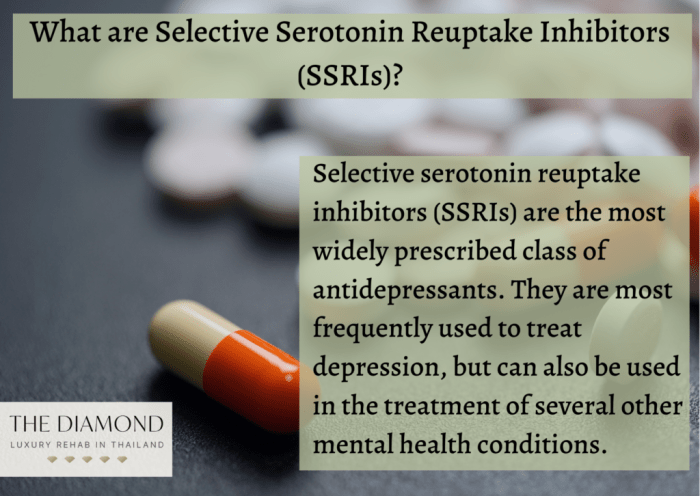SSRIs, or selective serotonin reuptake inhibitors, are a class of antidepressants that have revolutionized the treatment of mental health conditions. These medications work by increasing the levels of serotonin, a neurotransmitter associated with mood, sleep, and appetite, in the brain. By understanding how SSRIs function, their therapeutic applications, and potential side effects, individuals can make informed decisions about their mental health care.
SSRIs are commonly prescribed for a variety of conditions, including depression, anxiety disorders, obsessive-compulsive disorder (OCD), and post-traumatic stress disorder (PTSD). They are generally well-tolerated, but like all medications, they can have side effects. It is important to discuss any concerns or questions with a healthcare professional before starting or stopping any medication.
Legal and Regulatory Aspects: Ssri

The legal and regulatory landscape surrounding selective serotonin reuptake inhibitors (SSRIs) is complex and constantly evolving. It involves a delicate balance between ensuring the safety and efficacy of these medications while also providing access to individuals who need them. Regulatory bodies play a crucial role in this process, establishing guidelines for prescription, dispensing, and monitoring of SSRIs.
Prescription and Dispensing Regulations, Ssri
SSRIs are prescription-only medications, meaning they can only be obtained with a valid prescription from a licensed healthcare professional. This restriction aims to ensure that individuals receive SSRIs only after a proper assessment of their medical history, current symptoms, and potential risks. The prescription process involves a comprehensive evaluation, including:
- A detailed medical history, including any pre-existing conditions, allergies, and medications currently being taken.
- A physical examination to assess overall health and rule out any other underlying conditions.
- A mental health assessment to diagnose the specific condition being treated and determine if an SSRI is appropriate.
Once a prescription is issued, it is usually filled at a pharmacy. Pharmacists are also involved in the process, verifying the prescription, dispensing the medication, and providing information about its proper use and potential side effects.
Role of Regulatory Bodies
Regulatory bodies like the Food and Drug Administration (FDA) in the United States and the European Medicines Agency (EMA) in Europe play a critical role in ensuring the safety and efficacy of SSRIs. They are responsible for:
- Approving new SSRIs for market release after rigorous testing and clinical trials.
- Monitoring the safety and efficacy of SSRIs already on the market, including collecting and analyzing data on adverse effects.
- Setting standards for manufacturing, labeling, and packaging of SSRIs.
- Enforcing regulations to ensure that SSRIs meet safety and quality standards.
These bodies work closely with pharmaceutical companies to ensure that SSRIs are developed, manufactured, and marketed responsibly.
Legal Controversies and Challenges
Despite their widespread use, SSRIs have been subject to ongoing legal controversies and challenges. Some of the key issues include:
- Liability for Side Effects: There have been numerous lawsuits filed against pharmaceutical companies alleging that SSRIs caused serious side effects, such as suicidal thoughts and behaviors, especially in children and adolescents. These lawsuits have raised complex legal questions about the liability of manufacturers for the risks associated with their products.
- Off-Label Use: SSRIs are often prescribed for conditions other than those for which they are officially approved by regulatory bodies, a practice known as “off-label” use. This raises legal questions about the liability of manufacturers and prescribers when SSRIs are used for unapproved indications.
- Access to Treatment: There have been concerns about access to SSRIs, particularly for individuals with limited financial resources. This issue involves balancing the need to ensure affordability of these medications with the need to prevent misuse and abuse.
These legal controversies highlight the ongoing debate surrounding the risks and benefits of SSRIs and the need for careful consideration of their use in clinical practice.
SSRIs have become a cornerstone of mental health treatment, offering hope and relief to millions of people. While they are not a cure-all, they can be an effective tool for managing symptoms and improving quality of life. Understanding the nuances of SSRI therapy, including their mechanisms, potential benefits and risks, and alternative treatment options, empowers individuals to actively participate in their mental health journey.
SSRIs, or selective serotonin reuptake inhibitors, are a common class of antidepressants. They work by increasing the levels of serotonin in the brain, which can help to improve mood and reduce symptoms of depression. While SSRIs are effective for many people, they can sometimes cause side effects, such as nausea, headaches, and sexual dysfunction. For pain relief, you might consider taking naprosyn 250 , which is a nonsteroidal anti-inflammatory drug (NSAID) used to treat pain and inflammation.
It’s important to consult a healthcare professional to determine the best course of treatment for your specific needs.